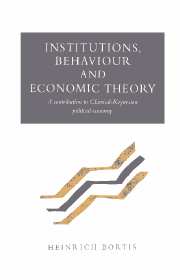Book contents
- Frontmatter
- Contents
- Preface
- Acknowledgements
- Glossary of symbols
- 1 Introduction
- 2 Some basic concepts and issues in the social sciences
- 3 Some basic issues in political economy
- 4 Towards a coherent system of political economy
- 5 Classical-Keynesian political economy and neoclassical economics
- 6 An alternative theory of economic policy
- 7 Political economy in a wider context
- References
- Index
3 - Some basic issues in political economy
Published online by Cambridge University Press: 14 January 2010
- Frontmatter
- Contents
- Preface
- Acknowledgements
- Glossary of symbols
- 1 Introduction
- 2 Some basic concepts and issues in the social sciences
- 3 Some basic issues in political economy
- 4 Towards a coherent system of political economy
- 5 Classical-Keynesian political economy and neoclassical economics
- 6 An alternative theory of economic policy
- 7 Political economy in a wider context
- References
- Index
Summary
This chapter, like the preceding one, deals with fundamentals, but at a lower degree of abstraction and on a more specific level: instead of considering the whole of society, some basic issues relating to classical-Keynesian political economy are dealt with briefly. The first section is devoted to definitional issues concerning the content and the method of political economy. In the subsequent section the classical-Marxian vision of the institutional set-up is sketched. The third section deals with the classical heritage and the Keynesian problem, to be combined in classical-Keynesian political economy. The classical element in political economy will be examined quite closely and will be taken for granted subsequently. The object of section four is the seemingly abstract question of space and time, which has to be dealt with to be able to tackle some methodological difficulties and to prepare the ground for a broad classification of existing classical-Keynesian economic theories. The main concern of the methodological final section is with the relationship between theory and history. It is necessary to deal with this issue in order to attempt to bridge the gap existing between the institutionally and historically minded political economists on the one hand and the theorists on the other.
Definitional issues in political economy and economics
This section links up the preceding and the subsequent chapters. Some connections are established between the fundamentals in the social sciences and some aspects of the content and the method of political economy. The first subsection aims at broadly defining the notions of political economy and economics. Subsequently the meaning of classical-Keynesian political economy is elucidated somewhat.
- Type
- Chapter
- Information
- Institutions, Behaviour and Economic TheoryA Contribution to Classical-Keynesian Political Economy, pp. 75 - 130Publisher: Cambridge University PressPrint publication year: 1996



